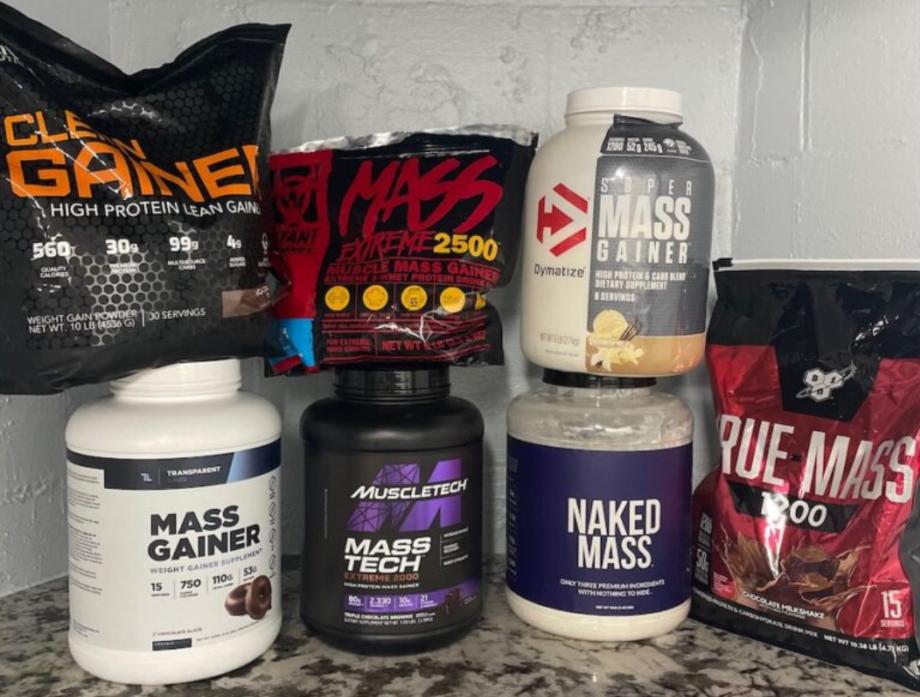We test and review fitness products based on an independent, multi-point methodology. If you use our links to purchase something, we may earn a commission. Read our disclosures.
As a competitive weightlifter for over two decades, I can attest to this sentiment: Any athlete or gym-goer serious about building strength has looked up the best supplements for muscle growth at some point. Especially if you consider yourself a “hard gainer,” muscle gain might be a challenge, so you want to know the best method to help add weight and bulk up.
For those struggling to put on lean muscle mass, you may have looked up and read about the best mass gainers, which have enough calories to boost any athlete’s caloric intake. However, before you use a mass gainer, it’s good to know the benefits, along with any risks of this dietary supplement.
So, what are the pros and cons? I talked with USA Weightlifting’s Meagan O’Connor, RD, a sports dietitian who helps athletes cut or gain weight for weight class sports, about mass gainer pros and cons. Although mass gainers are pretty safe to use, there are some instances where your fitness goals may not best be suited by a mass gainer supplement. Let’s take a closer look at mass gainers.
Medical disclaimer: This article is intended for educational and informational purposes only. It is not intended as a substitute for medical advice. For health advice, contact a licensed healthcare provider.
What Is Mass Gainer?
Although it may look like protein powder, a mass gainer is actually a blend of the three macronutrients—protein, fats,and carbohydrates. While the exact ratio of macros will vary, the typical breakdown is that a mass gainer has a good amount of protein (at least 25 grams of protein), a high amount of carbs, and a lower amount of healthy fats.
Some mass gainers will add micronutrients like creatine or different vitamins and minerals, but the macronutrients are the main constant across brands.
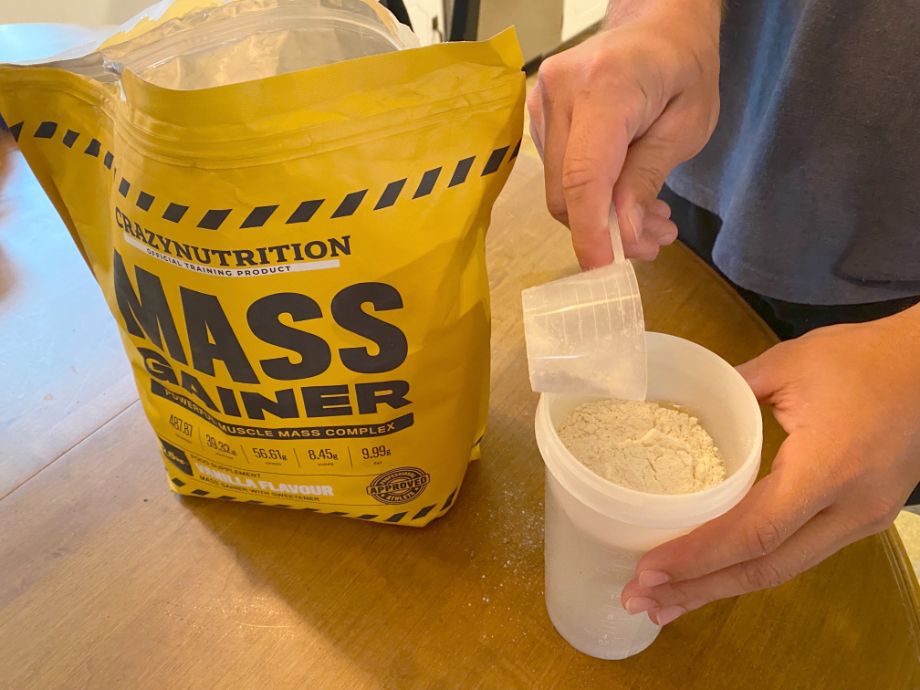
The ratio of macronutrients helps replenish protein and carbohydrate stores in the body for energy, which is why the bulk of a mass gainer is of those macros. “Because the goal is to replenish protein and carbohydrates, the fat in a mass gainer is minimal, since added fat would slow that process down,” Meagan adds.
RELATED: Best Protein Powder for Weight Gain
The goal of a mass gainer is to increase the user’s body weight, typically with the end result of increased muscle mass. With a calorie content between 500 and 1,500 calories per serving, using mass gainers helps lifters increase their calorie intake with a good ratio of macros to enhance weight gain.
Usually, the protein is sourced from a whey protein concentrate or isolate, but it can also be derived from casein or another source of protein. Carbohydrates can come from maltodextrin, which is derived from corn starch, or from natural sources such as sweet potatoes.
Pros of Mass Gainer
For those considering whether or not to use mass gainer supplements, there are quite a few benefits to them, especially when your fitness goals are gaining serious mass with muscle gain.
Good Source of Calories
If muscle building is the goal, you’re going to need more than just protein content; you have to make sure you’re getting enough calories, as well. Unlike most protein supplements, mass gainers are high-calorie supplements, ranging from 500 to 1,500 calories per serving, and sometimes more.
RELATED: Transparent Labs Mass Gainer Review
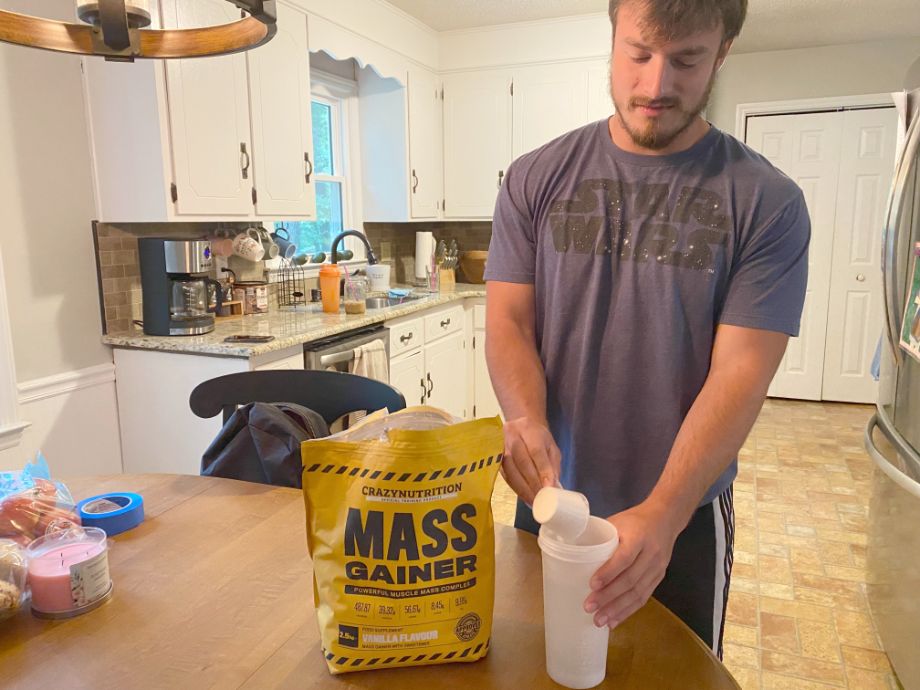
For those in a bulking phase trying to hit a caloric surplus, mass gainers are an easy way to increase your daily caloric intake with the goal of weight gain. The extra calories also come from high protein and carbohydrate amounts, used to help replenish glycogen stores1. So using a mass gainer as a quick post-workout protein shake can help replenish carbohydrates and increase protein intake, all while meeting your calorie goals.
May Help Build Muscle
While a caloric surplus won’t guarantee all of your weight gain goes straight to the muscles, it can definitely help you build muscle when paired with resistance training. According to a December 2019 review2, muscle hypertrophy—or building muscle—is best achieved through the proper balance of protein consumption and resistance training.
In short, the amount of new proteins made through amino acids and muscle protein synthesis should exceed the amount of proteins broken down through training. A high-quality mass gainer can help achieve a surplus of protein, which will aid in muscle recovery and building muscle.
RELATED: How Much Protein Do You Need to Gain Muscle?
Low-Volume Method to Get Nutrients
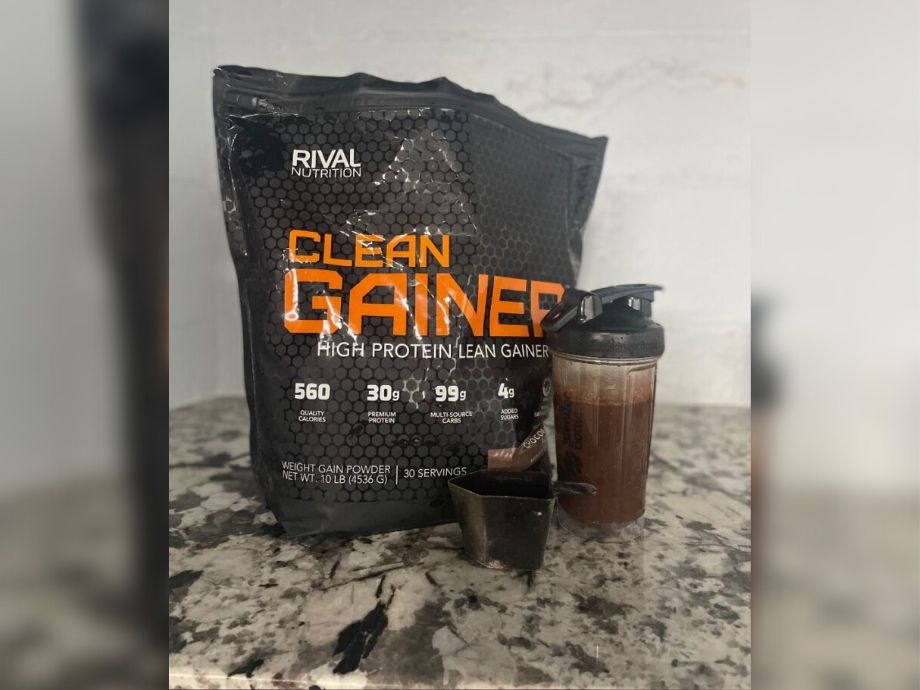
Although the serving size of mass gainers can vary between two and six scoops, Meagan says they’re a pretty low-volume way to get extra calories into a balanced diet. “You can get extra calories, macros, and nutrients into your daily diet without feeling too stuffed afterwards,” she adds. You can get a pretty dense amount of protein, carbs, and calories all within the equivalent of a protein shake.
Cons of Mass Gainer
Although there’s a lot to be “gained” from mass gainers—if I see a pun I’m going to say it—there are some cons to consider. For some, their fitness goals may not best be fulfilled through mass gainer supplements, while for others it could cause unwanted side effects. Let’s take a deeper dive into the possible negatives of a mass gainer.
May Gain Unwanted Fat
Most people using a mass gainer are OK with putting on a little bit of fat; bodybuilders call it their bulking phase, as they’ll deal with the extra fat during their cutting phase. Still, not everyone is looking to put on unwanted fat. Mass gainers will help gain weight, but it won’t necessarily be all muscle.
For someone whose goal is to build muscle without unwanted fat, then they may want to consider a protein powder instead, like whey protein isolate, which has fewer calories (between 100 and 300) and is almost entirely protein. The focus on protein intake will provide a low-calorie option for those wanting to support muscle-building and recovery.
RELATED: Mass Gainer vs Whey Protein
Relying On Mass Gainers Over Whole Foods
Bodybuilders, athletes, and gym-goers alike can all fall into the habit of relying only on supplements to get their macronutrients. The same is said for mass gainers; it shouldn’t be your only source of nutrients throughout the day. “Relying on mass gainers for calories and not getting enough whole foods in your diet could lead you to miss out on important nutrients in your diet,” Meagan says.
RELATED: The Best High-Protein Foods
While some mass gainers have added micronutrients into their formula, most mass gainers will leave a bit of a gap in important vitamins and minerals. According to a July 2019 review3, bodybuilders over-relying on supplements may lack vitamins and minerals in their diets, which can lead to deficiency issues like scurvy and anemia.

No matter the type of supplement you’re using, it’s important to remember that it should “supplement” a balanced diet.
Gastrointestinal Issues
Mass gainers have a lot of macronutrients and calories. Because of this, it can cause gastrointestinal issues, especially due to the high macronutrient content4. Gastrointestinal issues can include bloating, stomach pain, and nausea, along with other symptoms.
In particular, mass gainers often have whey protein as the source of protein, which is derived from milk and lactose. Anyone with a dairy allergy5 or sensitivities to milk may want to avoid these particular mass gainers, as they too could cause stomach issues.
Can Be Pricey
Mass gainers are one of the pricier types of supplements on the market, with prices per serving costing over $2 on the low end, but being as much as $6 or more on the high end. While mass gainers can be a quick, efficient way to add calories to your diet, Meagan warns that it could cost more in the long run than just adding more whole foods to your diet.
Who Should Take Mass Gainers?
Now that we’ve looked at the positives and negatives of mass gainers, who is best-suited for this type of supplement?
Hard Gainers
For some, such as a heavyweight Olympic lifter like myself, gaining weight isn’t too difficult; for others, it can take a lot of work. People who have difficulty with weight gain are referred to as hard gainers. Oftentimes, hard gainers can be extremely active to where getting enough calories throughout the day for a surplus is a real challenge. Additionally, they may have a faster metabolism.
RELATED: Crazy Nutrition Mass Gainer Review
Mass gainers can be a great and quick way to add enough calories to aid in a hard gainer’s weight gain. Furthermore, some people may need to gain weight for medical or health reasons, and a mass gainer can also be an efficient solution to help gain weight healthily.
Sport-Specific Athletes
Meagan O’Connor, RD, has worked with weightlifters and other athletes who are in a sport requiring weight classes. “People who are looking to gain weight or grow into a specific weight class could benefit from a mass gainer as a supplement,” she says.
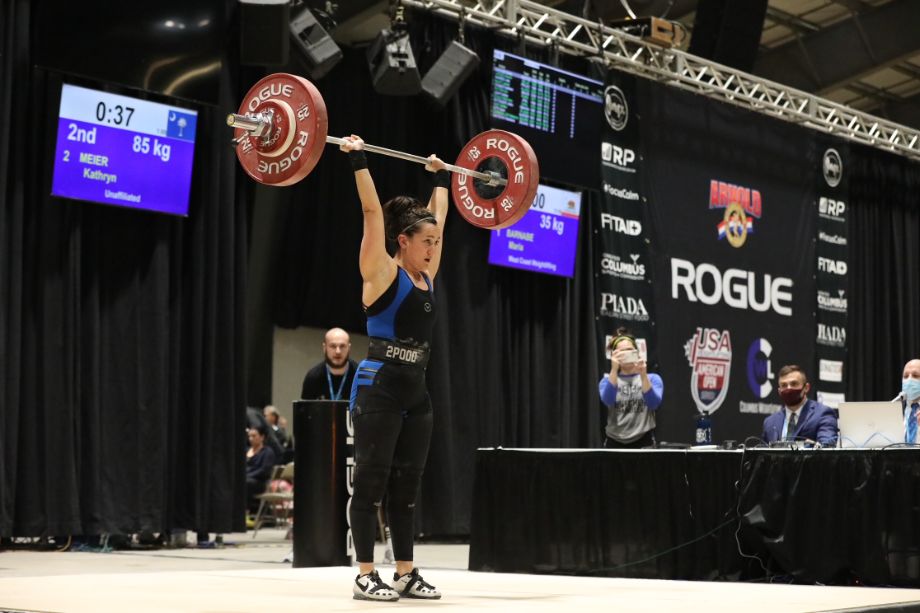
In weight class sports, going up or down a weight class is somewhat common in an athlete’s career to help determine where they can perform best. When they’re moving up a weight class, mass gainers can help them fill out the class quickly and efficiently.
RELATED: How To Make DIY Mass Gainer
Meagan also suggests that mass gainers can be helpful outside of weight classes. Some specific sports positions require a good amount of muscle, like a football lineman. A mass gainer could be beneficial to keep mass up on these athletes. “It’s especially helpful for people who have laborious jobs or schedules and struggle to eat enough food throughout the day,” Meagan adds.
Bulking Phase Bodybuilders
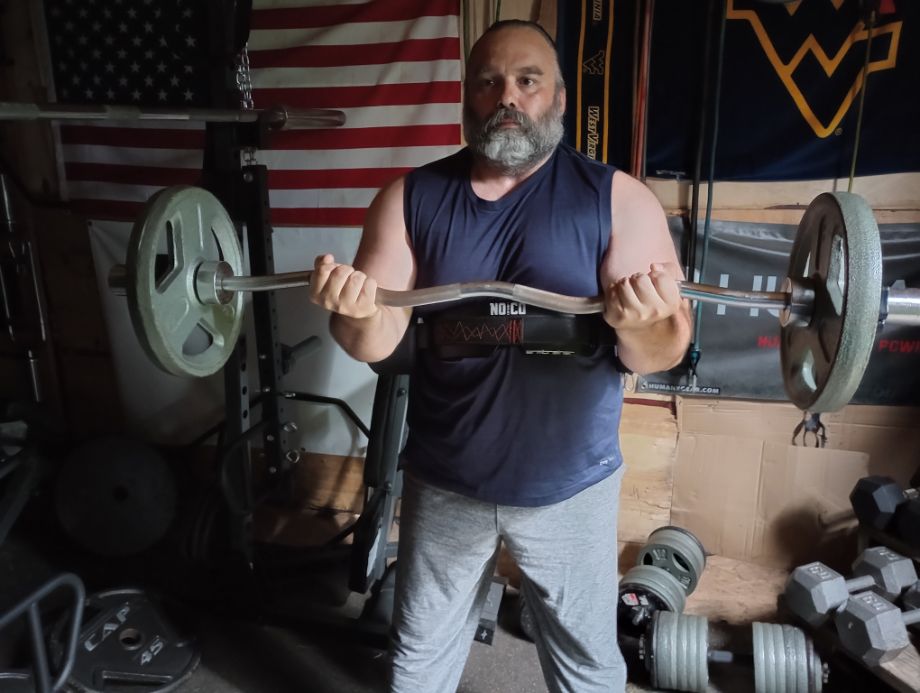
Competitive bodybuilders commonly go through a bulking phase, followed by a cutting phase, leading up to a competition. During a bulking phase, bodybuilders try to gain mass—muscle and fat—to increase muscle size and strength, and then lose the excess fat during their cut. During the bulking phase, a mass gainer can be extremely helpful to have as a good source of extra calories and macros.
RELATED: Guide to Bulking and Cutting
Who Shouldn’t Take Mass Gainers?
Mass gainers can be great for anyone trying to put on mass, but that’s not everyone’s goal in the weight room. Here are a few types of people whose goals may not be best suited for mass gainers.
Easy Gainers
Unlike hard gainers, an easy gainer can put on mass pretty easily. They may be less active, or have a predisposition to gain weight due to a slower metabolism. For those who can gain weight easily, you may not need the extra aid of a mass gainer.
Those Maintaining or Losing Weight
Mass gainers are designed specifically for weight gain, so if your fitness goals involve maintaining weight or even losing weight, then mass gainer isn’t a great supplement to take. Meagan suggests, “Athletes and people trying to maintain their current body weight or make a lower weight class should opt for protein from whole foods and protein isolates rather than mass gainers.”
RELATED: Best Weight-Loss Supplements
Mass Gainer Pros and Cons: Final Thoughts
Are mass gainers all that you need? No, but they can be helpful. If building muscle and strength is your fitness goal, Meagan recommends sticking to the basics first: “Be consistent in everything you do. Continue training on a regular basis and try to eat meals or snacks every 3 to 5 hours throughout the day. Prioritize lean protein, quality carbohydrates, and healthy fats at your meals.”
Building muscle starts by eating more calories than you’re burning in a day. Mass gainers are a fantastic way to add calorie content to your daily diet without much extra hassle, but they aren’t for everyone and every fitness goal. Here are a few key points to remember to determine if a mass gainer would be beneficial for you and your goals.
- Mass gainers are an efficient way to add calories to your diet, making them a nice addition for anyone looking to gain weight for medical or fitness reasons.
- With a high calorie and high protein content, mass gainers may help with building muscle over time.
- If your goal is maintaining or losing weight, mass gainers may be counterproductive, leading you to gain unwanted fat.
- Mass gainers can cause some gastrointestinal issues, especially if they have milk-derived whey or casein protein, due to their high calorie content.
- Even while taking a mass gainer, it’s important to prioritize healthy, whole foods to ensure you’re getting a nice balance of micronutrients, vitamins, and minerals.
Mass Gainer Pros and Cons: FAQs
Are mass gainers good or bad for you?
Mass gainers can be good for you, depending on your fitness goals. If your goal is to gain weight and build muscle, a mass gainer can help you achieve a caloric surplus for the day, which will lead to weight gain. Also, some people may use a mass gainer to gain weight for medical reasons.
If your goal is weight maintenance or even weight loss, a mass gainer wouldn’t be a good option. Instead, you should choose a low-calorie protein powder.
RELATED: Best Protein Powder for Weight Loss
Is mass gainer good for skinny guys?
Some people may struggle to gain weight, either from a high metabolism or an active schedule. These “hard gainers,” as they are called, can benefit from mass gainers. A mass gainer can provide a substantial amount of calories in one serving, which could be enough to allow a hard gainer to consume more calories than they’re burning, leading to weight gain.
Will I lose weight if I stop taking mass gainers?
While cutting a mass gainer from your supplement stack will certainly drop your calorie intake each day, it won’t necessarily guarantee you lose weight. The only way to ensure weight loss is to be in a calorie deficit.
Removing a mass gainer from your diet might put you in a deficit already, but for best results (losing fat and maintaining muscle), you should also exercise regularly, including resistance training into your workouts, and eat healthy sources of whole foods, including fruits and vegetables, lean protein and meats, and healthy fats.
These statements have not been evaluated by the Food and Drug Administration. This product is not intended to diagnose, treat, cure, or prevent any diseases.
References
- Margolis LM, Allen JT, Hatch-McChesney A, Pasiakos SM. Coingestion of Carbohydrate and Protein on Muscle Glycogen Synthesis after Exercise: A Meta-analysis. Med Sci Sports Exerc. 2021 Feb 1;53(2):384-393. doi: 10.1249/MSS.0000000000002476. PMID: 32826640; PMCID: PMC7803445.
- Krzysztofik M, Wilk M, Wojdała G, Gołaś A. Maximizing Muscle Hypertrophy: A Systematic Review of Advanced Resistance Training Techniques and Methods. Int J Environ Res Public Health. 2019 Dec 4;16(24):4897. doi: 10.3390/ijerph16244897. PMID: 31817252; PMCID: PMC6950543.
- Iraki J, Fitschen P, Espinar S, Helms E. Nutrition Recommendations for Bodybuilders in the Off-Season: A Narrative Review. Sports (Basel). 2019 Jun 26;7(7):154. doi: 10.3390/sports7070154. PMID: 31247944; PMCID: PMC6680710.
- Wilson P. Sport Supplements and the Athlete’s Gut: A Review. Int J Sports Med. 2022 Sep;43(10):840-849. doi: 10.1055/a-1704-3086. Epub 2021 Nov 23. PMID: 34814219.
- Fadam B, Ambadkar R, Rathod K, et al. Health benefits of whey – a brief review. Int J Livest Res. 2018;8(5):31-49. doi: 10.5455/ijlr.20170411022323
Further reading

Will this pricey adjustable bench blow your socks off? Find out in our in-depth Rogue Manta Ray Bench review. Read more

Did you know that all you need to get jacked biceps and triceps is a single kettlebell? Check out our kettlebell arm workout right here! Read more

Wondering how many reps to build muscle? In our guide, we’ll give you research-backed information on how to maximize your gains. Read more

I’m not the largest lifter out there (shocking, I know). So when I saw the size of the Rogue Thompson Fat Pad, I was immediately skeptical. This thing lives up to its name by being...well, fat, to the point it made me look like a little girl.But, as your parents probably told you, you should never judge a book by its cover. After all, a fat pad designed by powerlifting legend Donnie Thompson has to be good, right? In my review of the Rogue Thompson Fat Pad, I’ll discuss how my initial thoughts were flipped after putting it to the test. Why You Should Trust UsAside from having researched, used, and extensively tested dozens of weight benches—of all varieties—we’ve also compiled the most comprehensive guide for the best benches for home gyms. I personally used the Rogue Fat Pad withdumbbells, benching, barbell work and more.Beyond that, I’ve also spent years lifting weights, so I know what a comfortable weight bench feels like. And I’m a garage gym owner, so I know what people are looking for to get the most bang for their buck. You can trust I’ll give an honest review and not lead you in the wrong direction. Read more

